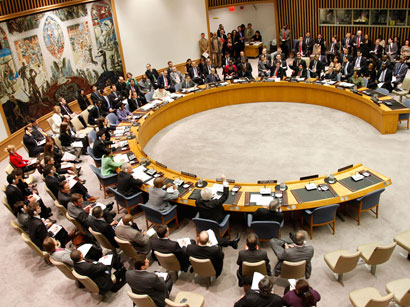Azerbaijan, Baku, May 27 / Trend /
Azerbaijan's Permanent Representative to the United Nations sent a letter to UN Secretary General, expressing the protest in connection with Armenia's military parade in the Azerbaijani occupied town of Khankendi.
"On May 9, 2012 the Armenian leadership has made another provocative action by conducting a military parade in the town of Khankendi, located in the occupied Nagorno-Karabakh region of Azerbaijan," the letter said. "Officially declared cause of holding parade, the presence of Armenian president Serzh Sargsyan and demonstration of weapons deserve special attention in the context of this outrageous act."
"According to the Armenian official sources, the parade was held on the occasion of the sixty-seventh anniversary of the end of the Second World War and the twentieth anniversary of the Armenian armed forces' occupation of Shusha - Azerbaijani historical and cultural center in Nagorno-Karabakh," the letter said. "Taking into account the Armenian policy of aggression, ethnic cleansing and annexation, celebrating these two dates by the leadership of the country is contrary to elementary logic. It demonstrates blatant disrespect for the memory of millions of people who gave their lives for freedom from tyranny and slavery during the Second World War, the letter said.
The Armenian President's visit to the Azerbaijani occupied territories and his presence at a military parade and demonstration of the most modern weapons during the parade destroys the myth that Armenia's actions have nothing to do with the occupation of Azerbaijani territories, Mehdiyev wrote.
"Holding the parade filled up a list of evidence of Armenia's direct military aggression against Azerbaijan and the establishment of its actual military and political control over its occupied territories," the letter said. "In fact, this parade has shown that Armenia continues increasing its military presence in these areas and deploys a large quantity of arms and ammunition beyond international control. If this is not so, the Armenian leadership must explain how the demonstrated types of weapons, including unmanned spy lethal vehicles, which were made in Armenia and were first publicly demonstrated at a military parade in Armenia on September 21, 2011, appeared in the Azerbaijani occupied territories."
"The Republic of Azerbaijan declares the strongest protest against Armenia's warlike gesture, and irresponsible rhetoric of its leadership," the letter said. "Such provocations as a military parade in the Azerbaijani occupied territories and the celebration of the occupying forces and the puppet armed gangs that are responsible for the heinous crimes committed against the Azerbaijani civilians during the war, are contrary to Armenia's obligations on international law, and within the ongoing process of the conflict settlement."
All the above-mentioned confirms that the Armenian policy still poses a serious threat to regional and international peace, security and stability and requires attention and response from the United Nations and the international community as a whole, the letter said.
The conflict between the two South Caucasus countries began in 1988 when Armenia made territorial claims against Azerbaijan. Armenian armed forces have occupied 20 per cent of Azerbaijan since 1992, including the Nagorno-Karabakh region and seven surrounding districts.
Azerbaijan and Armenia signed a ceasefire agreement in 1994. The co-chairs of the OSCE Minsk Group - Russia, France and the U.S. - are currently holding peace negotiations.
Armenia has not yet implemented the U.N. Security Council's four resolutions on the liberation of the Nagorno-Karabakh and the surrounding regions.






